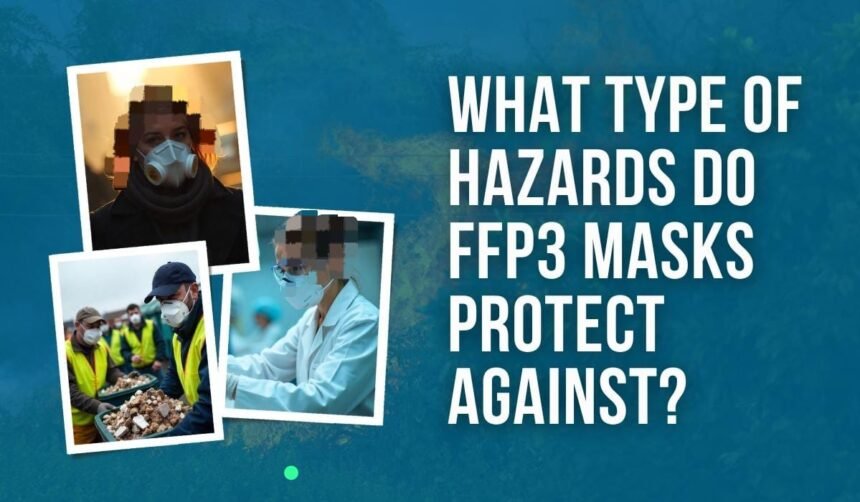Aerosols and small dust particles are among the most dangerous substances for human health, regardless of the workplace type, despite being almost invisible to the human eye. Workers are often exposed to airborne hazards in these areas, which are centers of cutting-edge research and testing.
Selecting the appropriate personal protection equipment (PPE) in such high-risk situations is not only a precaution but also an absolute need. The FFP3 masks are a vital line of defence among the several respiratory protection alternatives available, offering laboratory workers enhanced filtering. However, what do FFP3 respirators guard against? Let’s understand.
Significance of an FFP3 Mask
Respiratory face masks are often considered the first course of action in protecting the public’s health. They are now often observed in public places like sidewalks, shops, and congested areas after previously mainly being found in hospitals and other healthcare facilities.
Dust masks like the FFP3 mask in the UK provide excellent defence against harmful dusts, aerosols, mists, and spores, whether used in hazardous jobs or the chemical industry. They also provide protection against radioactive particles, airborne biological agents of risk groups 2 and 3, enzymes, and dangerous and cancer-causing water and oil-based particles.
An FFP3 mask is also required for welding stainless steel, handling heavy metals, hardwood, brake dust, and for protection against diseases such as bacteria, viruses, and fungal spores.
Get Protection against Diverse Health Hazards with FFP3 Masks
Understandably, the FFP3 masks are a must for people who work in hazardous chemical-filled or allergic situations. These are a great choice for protecting healthcare personnel from contracting infections through droplets due to their advanced filtering system that can withstand tiny airborne particles. Wearing a certified FFP3 mask at work offers protection against several additional risks, including the following:
- Harmful Aerosols
Before interacting with an infected or non-infected patient, all employees at government healthcare facilities and NHS trusts must wear FFP3 respirators. An aerosol is a tiny, fine-grained droplet that is released during inhaling, sneezing, coughing, and talking.
Additionally, when medical personnel execute specific surgical operations, aerosols are generated. For instance, tracheal intubation, resuscitation, and bronchoscopy. These tiny droplets stay in the atmosphere for a long period. So, it’s quite easy to inhale them through the nasal route or catch them in the mouth or eyes.
- General, Silica, and Wood Dust
Using FFP3 masks made especially for dusty environments is an additional option. These masks often have adjustable straps and integrated exhalation valves for a better fit. Even though additional precautions can assist in lowering general dust levels and enhancing air quality in enclosed areas, integrating an effective FFP3 half face mask can significantly boost your lung health. However, it is essential to consider aspects like comfort, fit, and filtration effectiveness while selecting substitute solutions to get the best defence against dust particles.
- Viral Diseases
Because they are pressure-induced and gravity-influenced, airborne virus-infected droplets expelled during a cough can travel over longer distances. Consequently, they can touch down up to a metre away from surfaces! Therefore, the likelihood of a transmission during these procedures or when interacting with a high-risk patient can be reduced if you wear a protective, properly fitting powered respirator.
- Particulate Matter
The FFP3 air fed mask also protects against small particles, also known as particulate matter, like PM2.5 and PM10 from industrial pollutants, automobile exhaust, and natural sources like wildfires. The fact that PM2.5 can enter the lungs deeply makes it harmful to respiration.
- Gaseous Pollutants
The Nitrogen Dioxide (NO2), released by automobile engines and industrial operations, can aggravate asthma by irritating the respiratory system. Burning fossil fuels releases Sulphur dioxide, which can also aggravate respiratory disorders, including asthma and bronchitis.
Moreover, a significant contributor to smog, ground-level ozone, can impair lung function and cause respiratory problems. An FFP3 mask can guard against these harmful gases released from industrial operations and automobile exhaust.
- Organic Vapours
The FFP3 filter mask guards against organic vapours used in spirit-based paints, many solvent cleaners, and pourable contact adhesives, while the valve provides you with the best defense against dust particles. The dust mask is required in construction sectors because it protects against numerous risks present in workshops and on construction sites.
- Carcinogenic elements
The FFP3 masks are the best defense against hazardous particles, including some known carcinogens like asbestos PPE. Additionally, these respirators provide protection from silica-containing masonry and wood-based dusts.
Bottom Line
Are you searching for a mask that protects you from dust and other dangerous particles? Medical face masks can provide good protection in some situations. However, they can’t filter out gases and vapours, which are minute airborne particles. Instead, FFP3 respirators and dust masks like the superior FFP3s are often worn in industrial and construction sites where workers are exposed to dust and other dangerous substances.
At Protective Masks Direct, We have a variety of respiratory protection equipment designed to filter out airborne particles. Our range of FFP3 dust masks is comfortable and protective, built to meet applicable international standards. Visit our online store and browse our collections to pick either a pack or buy an individual mask.









